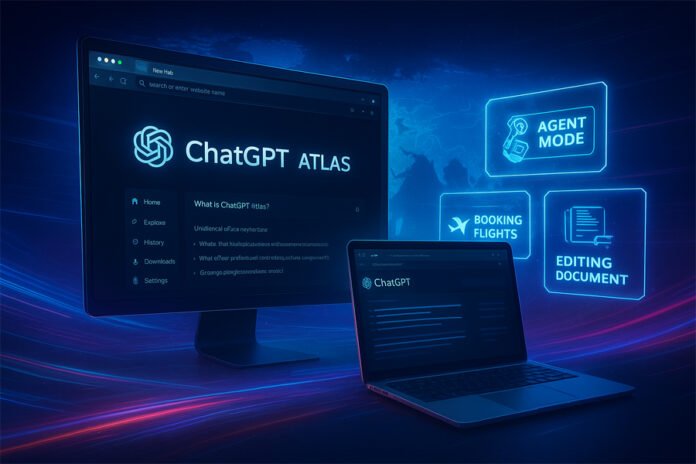In a move poised to redefine the internet experience, OpenAI has unveiled ChatGPT Atlas, an AI-powered web browser that integrates the capabilities of ChatGPT directly into your browsing workflow. The announcement, made on Tuesday, immediately sent shockwaves through the tech sector, causing Alphabet Inc., Google’s parent company, to lose an estimated $150 billion in market value — a staggering reaction reflecting investor anxiety over potential disruption.
Prior to the official launch, OpenAI had teased the browser with a six-second video on X, showing multiple tabs and hinting at “something big.” During a livestream, OpenAI CEO Sam Altman described Atlas as more than just a browser. “Atlas is an opportunity to redefine how users interact with the web, blending search, assistance, and automation in one platform,” Altman explained.
What is ChatGPT Atlas?
Built on Google Chrome’s Chromium engine, ChatGPT Atlas offers a familiar web interface while embedding ChatGPT capabilities directly into each page. This eliminates the need for separate tabs or copy-pasting queries, enabling seamless interaction with AI while browsing.
The most talked-about feature is “Agent Mode,” which allows the AI to control your cursor and keyboard to perform tasks automatically. Whether booking flights, researching products, or editing documents, Atlas takes interactivity to a new level. Currently, Agent Mode is available to ChatGPT Plus and Pro users, providing a glimpse into the future of autonomous AI browsing.
In addition, Atlas comes with memory and context features, remembering your previous searches and actions to provide more personalized, context-aware assistance. “It’s like having a virtual assistant embedded into every webpage,” said technology analyst Priya Sharma.
Why It Matters: Google Under Pressure
For years, Google Chrome has dominated the browser market, with its revenue model largely dependent on search-driven advertising. However, AI-powered browsers like Atlas could disrupt this model by providing direct answers and automating tasks, potentially reducing the need for traditional searches.
“OpenAI’s 800 million weekly users give them a massive platform that could erode Google’s core search traffic if adoption grows rapidly,” warned Ravi Mehta, a Silicon Valley analyst.
In response, Google has accelerated the integration of its own AI, Gemini, into Chrome and added enhanced search tools. “Competition is heating up,” said Mehta. “But OpenAI has taken the first real step in merging AI with the browsing experience.”
Market Reaction and Investor Concerns
The immediate fallout was dramatic: Alphabet’s stock dropped sharply following the announcement, marking one of the largest single-day market reactions to a tech launch in 2025. The $150 billion loss highlights investor concern that AI-integrated browsing could disrupt Google’s advertising revenue and search dominance.
“It’s a rare moment when a single product announcement triggers such a seismic market movement,” commented financial journalist Rakesh Kumar. “It shows how seriously investors are taking the AI browser threat.”
Implications for India and the Global Ecosystem
India, with its massive internet user base and growing tech ecosystem, is likely to feel the ripple effects. From advertisers to content publishers, the AI-driven shift could transform how users access information, search for products, and engage online.
Indian startups may face both challenges and opportunities. Companies relying on traditional search traffic may need to pivot, while AI-integrated platforms can potentially leverage the browser to deliver innovative services. Regulatory considerations, including data privacy and AI governance, will also play a key role.
Expert Opinions
Tech experts view Atlas as a potential game-changer:
Priya Sharma, Analyst: “Atlas isn’t just a browser; it’s a new interface paradigm. Users get answers, automation, and personalization without leaving the page.”
Ravi Mehta, Silicon Valley: “The combination of AI and browser automation could redefine search and productivity tools globally.”
Rakesh Kumar, Financial Journalist: “The market reaction reflects the high stakes. Alphabet is facing a credible challenge to its dominant model.”
The Road Ahead
The launch is just the beginning. Atlas is currently available for macOS, with Windows, iOS, and Android versions expected soon. The future will depend on adoption rates, Google’s competitive response, and the evolution of monetization strategies.
As AI continues to integrate into core digital experiences, ChatGPT Atlas represents a glimpse of what the next generation of web interaction might look like — seamless, personalized, and automated. For Google, OpenAI, and tech ecosystems in India and worldwide, the browser’s launch marks the start of an exciting and uncertain new chapter.
















